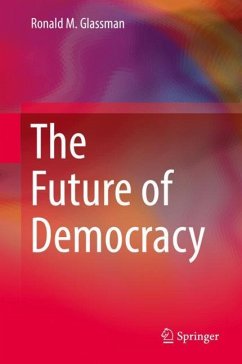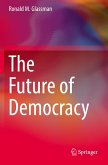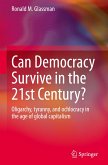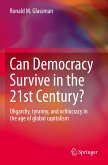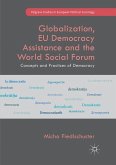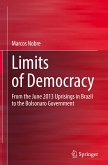Ronald M. Glassman
The Future of Democracy
Ronald M. Glassman
The Future of Democracy
- Gebundenes Buch
- Merkliste
- Auf die Merkliste
- Bewerten Bewerten
- Teilen
- Produkt teilen
- Produkterinnerung
- Produkterinnerung
This book focuses on the processes that help stabilize democracy. It provides a socio-historical analysis of the future prospects of democracy.
The link between advanced capitalism and democracy is emphasized, focusing on contract law and the separation of the economy from the state. The book also emphasizes the positive effects of the scientific world view on legal- rational authority. Aristotle's theory of the majority middle class and its stabilizing effect on democracy is highlighted.
This book describes the face to face democracies of the past in order to give us a better…mehr
Andere Kunden interessierten sich auch für
![The Future of Democracy The Future of Democracy]() Ronald M. GlassmanThe Future of Democracy47,99 €
Ronald M. GlassmanThe Future of Democracy47,99 €![Can Democracy Survive in the 21st Century? Can Democracy Survive in the 21st Century?]() Ronald M. GlassmanCan Democracy Survive in the 21st Century?116,99 €
Ronald M. GlassmanCan Democracy Survive in the 21st Century?116,99 €![Can Democracy Survive in the 21st Century? Can Democracy Survive in the 21st Century?]() Ronald M. GlassmanCan Democracy Survive in the 21st Century?116,99 €
Ronald M. GlassmanCan Democracy Survive in the 21st Century?116,99 €![Globalization, EU Democracy Assistance and the World Social Forum Globalization, EU Democracy Assistance and the World Social Forum]() Micha FiedlschusterGlobalization, EU Democracy Assistance and the World Social Forum85,99 €
Micha FiedlschusterGlobalization, EU Democracy Assistance and the World Social Forum85,99 €![Globalization, EU Democracy Assistance and the World Social Forum Globalization, EU Democracy Assistance and the World Social Forum]() Micha FiedlschusterGlobalization, EU Democracy Assistance and the World Social Forum85,99 €
Micha FiedlschusterGlobalization, EU Democracy Assistance and the World Social Forum85,99 €![Limits of Democracy Limits of Democracy]() Marcos NobreLimits of Democracy77,99 €
Marcos NobreLimits of Democracy77,99 €![Democratic Nationalism in Scotland Democratic Nationalism in Scotland]() Philipp RückheimDemocratic Nationalism in Scotland29,99 €
Philipp RückheimDemocratic Nationalism in Scotland29,99 €-
-
-
This book focuses on the processes that help stabilize democracy. It provides a socio-historical analysis of the future prospects of democracy.
The link between advanced capitalism and democracy is emphasized, focusing on contract law and the separation of the economy from the state. The book also emphasizes the positive effects of the scientific world view on legal- rational authority. Aristotle's theory of the majority middle class and its stabilizing effect on democracy is highlighted.
This book describes the face to face democracies of the past in order to give us a better perspective on the high tech democracies of the future, making it appealing to students and academics in the political and social sciences.
The link between advanced capitalism and democracy is emphasized, focusing on contract law and the separation of the economy from the state. The book also emphasizes the positive effects of the scientific world view on legal- rational authority. Aristotle's theory of the majority middle class and its stabilizing effect on democracy is highlighted.
This book describes the face to face democracies of the past in order to give us a better perspective on the high tech democracies of the future, making it appealing to students and academics in the political and social sciences.
Produktdetails
- Produktdetails
- Verlag: Springer / Springer International Publishing / Springer, Berlin
- Artikelnr. des Verlages: 978-3-030-16110-1
- 1st edition 2019
- Seitenzahl: 220
- Erscheinungstermin: 4. Juni 2019
- Englisch
- Abmessung: 241mm x 160mm x 18mm
- Gewicht: 484g
- ISBN-13: 9783030161101
- ISBN-10: 3030161102
- Artikelnr.: 55275206
- Herstellerkennzeichnung Die Herstellerinformationen sind derzeit nicht verfügbar.
- Verlag: Springer / Springer International Publishing / Springer, Berlin
- Artikelnr. des Verlages: 978-3-030-16110-1
- 1st edition 2019
- Seitenzahl: 220
- Erscheinungstermin: 4. Juni 2019
- Englisch
- Abmessung: 241mm x 160mm x 18mm
- Gewicht: 484g
- ISBN-13: 9783030161101
- ISBN-10: 3030161102
- Artikelnr.: 55275206
- Herstellerkennzeichnung Die Herstellerinformationen sind derzeit nicht verfügbar.
Ronald Glassman, PhD, is a sociologist. He has taught at NYU, Connecticut College, the City University of New York, and William Paterson University. Professor Glassman is a specialist in historical sociology and has authored many books on democracy, including The Origins of Democracy in Tribes, City-States and Nation-States (2 vols.); The Middle Class and Democracy in Socio-Historical Perspective; The New Middle Class and Democracy in Global Perspective; Caring Capitalism; China in Transition: Communism, Capitalism, Democracy; Democracy and Equality; with William Swatos, Jr., Charisma, History, and Social Structure; and other books. Glassman teaches at NYU in the Liberal Studies Program and history courses at NYUSPS in the Center for Applied Liberal Arts.
Introduction: Mixed Messages in the Twenty-first Century.- Part I. Democracy as a Uniquely Human Political Process.- Chapter 1. Humans in the Scientific State of Nature: The Emergence of the Democratic Discussion Council.- Chapter 2. Democracy and Despotism in Tribal Society: The Clan Council, The Tribal Assembly, The War Chief, The Shaman.- Chapter 3. City-State Democracy in Sumer, Syria, and Canaan-Phoenicia: The Council of City Fathers and the Citizens Assembly.- Chapter 4. Full Fledged Democracy in the City-States of Ancient Greece: Majority Rule at the Citizens Assembly; Constitutional Law; Jury Trials; the Rational-Scientific World-View Emerges.- Chapter 5. The Kingly-Bureaucratic State and the Integration of Large Political Areas: The Divine Kingship Makes Democracy Inconceivable.- Chapter 6. Democracy Revived in the City-States of Renaissance Italy: Oligarchy Overrides Democracy.- Chapter 7. The Northern European City-States Unite in Leagues: Representative Democracy Becomes Institutionalized in Switzerland, The Netherlands, and England.- Chapter 8. The Rational-Scientific World-View After the Protestant Reformation: Science and Legal-Rational Authority.- Part II. Democracy in the Modern World.- Chapter 9. Free Market Capitalism Undergirds City-States and Nation-State Democracy: Contract Law Reinforces Legal Authority.- Chapter 10. Four Ways Free Market Capitalism Reinforces Legal-Rational Democracy.- Chapter 11. Case Studies of Socio-Political Change in Developing Nations: India, China, Venezuela, Egypt, Syria, Iraq, Iran, and Spain.- Chapter 12. The Resurgence of Fascism in the Mid-Twenty First Century.- Part III. The Future of Democracy.- Chapter 13. The Hope for Democracy in the Near Future: Global Capitalism, Global Science, and the Global New Middle Class.- Chapter 14. High Technology, Mass Media as Strengthening Democracy: Immediacy and Community in the Blogosphere - Extremism Plus Increased Citizens Involvement.- Chapter 15. High Technology Totalitarianism: The Ultimate Dystopia; Manufactured Charisma in the Cyber World.- Chapter 16. Utopian Visions: Good and Bad Effects on Actual History.- Chapter 17. Education for Democracy in the Twenty-First Century: British Classical Education has a Positive Influence on Developing Nations; Civics Education at the High School (Gymnasia) Level.- Chapter 18. Climate Change as a Challenge to the Legitimacy of Advanced Capitalist Democracies.- Chapter 19. Violence vs. Words: Despotism vs. Democracy.- Chapter 20. A Note on the Great Thinkers Whose Writings on Democracy Influence This Work.
Introduction: Mixed Messages in the Twenty-first Century.- Part I. Democracy as a Uniquely Human Political Process.- Chapter 1. Humans in the Scientific State of Nature: The Emergence of the Democratic Discussion Council.- Chapter 2. Democracy and Despotism in Tribal Society: The Clan Council, The Tribal Assembly, The War Chief, The Shaman.- Chapter 3. City-State Democracy in Sumer, Syria, and Canaan-Phoenicia: The Council of City Fathers and the Citizens Assembly.- Chapter 4. Full Fledged Democracy in the City-States of Ancient Greece: Majority Rule at the Citizens Assembly; Constitutional Law; Jury Trials; the Rational-Scientific World-View Emerges.- Chapter 5. The Kingly-Bureaucratic State and the Integration of Large Political Areas: The Divine Kingship Makes Democracy Inconceivable.- Chapter 6. Democracy Revived in the City-States of Renaissance Italy: Oligarchy Overrides Democracy.- Chapter 7. The Northern European City-States Unite in Leagues: Representative Democracy Becomes Institutionalized in Switzerland, The Netherlands, and England.- Chapter 8. The Rational-Scientific World-View After the Protestant Reformation: Science and Legal-Rational Authority.- Part II. Democracy in the Modern World.- Chapter 9. Free Market Capitalism Undergirds City-States and Nation-State Democracy: Contract Law Reinforces Legal Authority.- Chapter 10. Four Ways Free Market Capitalism Reinforces Legal-Rational Democracy.- Chapter 11. Case Studies of Socio-Political Change in Developing Nations: India, China, Venezuela, Egypt, Syria, Iraq, Iran, and Spain.- Chapter 12. The Resurgence of Fascism in the Mid-Twenty First Century.- Part III. The Future of Democracy.- Chapter 13. The Hope for Democracy in the Near Future: Global Capitalism, Global Science, and the Global New Middle Class.- Chapter 14. High Technology, Mass Media as Strengthening Democracy: Immediacy and Community in the Blogosphere - Extremism Plus Increased Citizens Involvement.- Chapter 15. High Technology Totalitarianism: The Ultimate Dystopia; Manufactured Charisma in the Cyber World.- Chapter 16. Utopian Visions: Good and Bad Effects on Actual History.- Chapter 17. Education for Democracy in the Twenty-First Century: British Classical Education has a Positive Influence on Developing Nations; Civics Education at the High School (Gymnasia) Level.- Chapter 18. Climate Change as a Challenge to the Legitimacy of Advanced Capitalist Democracies.- Chapter 19. Violence vs. Words: Despotism vs. Democracy.- Chapter 20. A Note on the Great Thinkers Whose Writings on Democracy Influence This Work.

